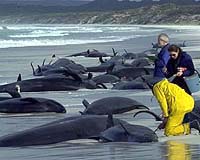| . |  |
. |
Stanford CA (SPX) Jan 19, 2010 Genetic analyses refute the hypothesis that an overly abundant population of minke whales is creating too much competition over food for populations of other whale species to rebound, according to a new study supported by the Lenfest Ocean Program and published this week in the journal Molecular Ecology. The study's findings indicate that the Southern Ocean minke whale population around Antarctica has not grown unnaturally large in the wake of industrial whaling, which decimated populations of other larger whales in the region. Some whaling proponents in the international policy debate have argued that culling minke whales is a valid management solution for allowing populations of large whales to recover to their former levels. This study suggests that killing minke whales will not help the larger whale species to recover. "We can ascertain that today's populations of minke whales are roughly similar in size to populations prior to early 20th century commercial whaling of larger species," said lead author Kristen Ruegg of Stanford University. "The research suggests that direct competition for food is not keeping the large whale populations from recovering." Baleen whales feed on small animals, such as the crustacean krill, by filtering them through broom-like structures in their mouths called baleen. Some scientists had hypothesized that the Southern Ocean population of minke whales- the smallest member of the baleen whale family - had increased due to a lack of competition for food after industrial whalers killed more than two million large baleen whales, such as blue, humpback, sei and fin whales. "Hopefully this study will help managers make more informed decisions about how best to manage whale populations in the Southern Ocean," said co-author Stephen Palumbi of Stanford University. "It has always been important to test hypotheses before using them in management." The authors tested 52 samples of minke whale meat purchased at Japanese markets and isolated genetic markers that identify how much genetic diversity resides within the population. Researchers were then able to extrapolate how many individuals within the population most likely contributed to the gene pool. The scientists offered several possibilities for why minke whales may not be in direct competition with other whale species in the Southern Ocean. One reason may be that minke whales are limited by factors other than food supply. Another possibility may be that minke whales do not feed on krill at the same time or in the same way as large whales and so do not directly compete with them.
Share This Article With Planet Earth
Related Links Video presentation of captions and graphics etc Follow the Whaling Debate
 More than 125 whales die in New Zealand strandings
More than 125 whales die in New Zealand strandingsNelson, New Zealand (AFP) Dec 28, 2009 More than 125 whales have died in two separate strandings in New Zealand, conservation officials said Monday. At Farewell Spit, west of the South Island tourist town of Nelson, 105 long-finned pilot whales died in a mass beaching on Saturday, while 21 pilot whales died Sunday at a beach on the east coast of the North Island. Both areas have a history of whale strandings. Conservation ... read more |
|
| The content herein, unless otherwise known to be public domain, are Copyright 1995-2009 - SpaceDaily. AFP and UPI Wire Stories are copyright Agence France-Presse and United Press International. ESA Portal Reports are copyright European Space Agency. All NASA sourced material is public domain. Additional copyrights may apply in whole or part to other bona fide parties. Advertising does not imply endorsement,agreement or approval of any opinions, statements or information provided by SpaceDaily on any Web page published or hosted by SpaceDaily. Privacy Statement |